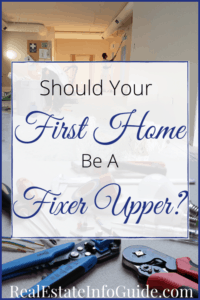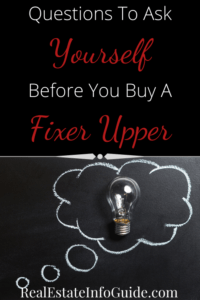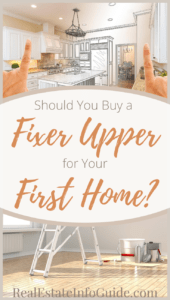You’re a first-time buyer, and you watch HGTV. It looks easy enough to swing a sledgehammer through a wall and splash what walls remain with some paint. So, you just have to find the right property, one that needs some TLC, and you’ll be good to go. However, should your first home be a fixer-upper? Do you really know precisely what you are getting into, and are you equipped to cope with the physical, mental, emotional, and financial strains that can result from the purchase of a potential money pit?
 Should Your First Home Be A Fixer-Upper?
Should Your First Home Be A Fixer-Upper?
To know if your first home should be a fixer-upper, ask yourself:
- Why do I want to buy a fixer-upper?
- How much time, money, energy, and effort can I afford?
- Where are my budget and timeline figures coming from? Have they come from professionals, or am I making guesstimates?
- When I have finished, will the home be worth more than the total purchase and reno costs?
- Do I plan to stay here long-term?
- What would happen if I were forced to move mid-renovation?
Actually, these questions are just the tip of the iceberg. Let’s take a look at these questions and some others that spring from them, in a little more depth. Then you can make a more informed decision when you ask yourself, should your first home be a fixer-upper.
 What Is A Fixer-Upper?
What Is A Fixer-Upper?
There is no single hard and fast definition of a fixer-upper. Most people take it to mean a property that needs some work doing to it in order to live in it comfortably.
However, even that does not tie it down enough because one person’s idea of comfortable is another person’s idea of roughing it.
So, let’s define a fixer-upper as a property that needs some repairs, renovations, or fixes of some kind. Still, at the same time, although they may not be entirely happy about it, the average person would be able to cope with living in such a property.
The upside of buying a fixer-upper is that you will, generally speaking, get more property for your dollars. The downside is that these homes are put on the market as-is and price concessions in return for repair costs etc. are unlikely.
Why Do You Want To Buy A Fixer-Upper?
For the purposes of this post, I’m going to ignore the people who buy and flip homes as their business, or as a way to generate an additional income. Instead, let’s focus on those regular folk who are buying their first home. Among those people, the primary reason for buying a fixer-upper tends to be one of the following:
- It feels like the only way for you to get on the property ladder.
- You get more square footage or a location, or both that you would be unable to afford if it were a “turnkey” home.
- You have “always wanted to buy and renovate a home.”
- You’re in a hurry, or there is very limited housing stock.
- You have plans for a highly customized final home, so a fixer-upper makes financial sense. After all, there’s no point paying good money for a finished house only to rip it apart.
- You’re planning to flip the home quickly and move onwards and upwards.
 What You Need To Ask Yourself Before You Decide To Buy A Fixer-Upper
What You Need To Ask Yourself Before You Decide To Buy A Fixer-Upper
Knowing your motivation for buying a fixer-upper will not help you decide if it’s the right decision for you. What you really need to do is ask yourself the following questions. Only then you can establish whether you are ready to cope with buying a fixer-upper and whether that decision will really lead to the result you are looking for.
There are two types of questions to use in your decision-making process.
First, the general “is a fixer-upper right for me in principle?” type questions and second the “Is this particular fixer-upper right for me?” queries.
How Long Do I Plan To Live Here?
While you still have to budget, price out, and plan your renovation, if this is to be your forever home, knowing at what stage you will show a profit is probably fairly low down on your list. That’s not to say you don’t have to ask yourself the rest of the questions, just that the “break-even” point on the calendar won’t necessarily be a factor in your decision making.
For anyone else, the amount of time you plan to live in the property should be used, along with the “make a profit point” to decide if it is a financially sensible decision.
 Can You Cope With Living In A Fixer-Upper?
Can You Cope With Living In A Fixer-Upper?
This is a time to be totally honest with yourself. Can you cope with living in a home that has a 1960’s kitchen, a decorative aesthetic from 1978, or the “improvements” carried out by an exuberant DIY’er whose enthusiasm far outweighed their skills or taste?
If you find yourself lying in bed at night thinking, “I’m sure it will be alright. I can grin and bear it” listen to your doubts and give some serious thought as to whether you’re doing the right thing.
How Long Will The Renovations Take?
Ask yourself how long the repairs or upgrades to the property are going to take and if you are able to live in your fixer-upper for that long while the work is taking place.
Are you planning to live in the home for 6 months before you sell? Or are you planning to make most of your renovations over a period of a couple of years?
What Would Happen If I Had To Move?
Life happens. Even though you may have carefully planned your budget and timelines, you may find that unexpected events, out of your control, result in your having to move home.
So, consider if you had to move what would happen? Would you have to take a significant financial loss? Would you be able to keep your fixer-upper? While the answers to these questions may not be the deciding factors, you should a least give them some consideration.
How Much Will It Really Cost?
The total cost of a fixer-upper is not equal to the purchase price plus the amount you think it will cost to fix-up. You will also have to take into account things like appraisals, home inspections, property taxes, mortgage interest, budget over-runs, the list of additional expenses goes on, and on, and on.
Before you make the general decision to purchase a fixer-upper, be sure you have a clear understanding of the real costs and timelines associated with different levels of renovation. This way, when you view a property, you will have a rough idea of the costs you will be facing.
Once You Have Found A Potential Property
So you’ve decided, in principle, that a fixer-upper might be right for you. Now you need to know what to look for when buying a home and ask some questions for each potential property you view.
How Much Will This Property Cost?
When you are evaluating a particular property to see if it will work within your budget, never make a guess about how much a specific fixer-upper is going to cost to renovate, or estimate the value of the property when you have finished.
Instead, start by having a home inspection. Attend the inspection and ask plenty of questions to ensure you are clear about the scope of the work required. Where necessary, have additional specialist inspections to cover areas such as toxic mold, pests or vermin, lead paint, asbestos. The older a home is, the more important this becomes. Although there are disclosure requirements in the United States, if the homeowner is not aware they have lead paint, they will not be able to disclose the fact to you.
Then, ensure you have professionals provide you with clearly itemized estimates with timelines attached. This is the only way to create an informed picture of realistic timelines, costs, and to establish the point you will be likely to turn a profit.
Could I Live In This Property?
Of course, we all have different levels of tolerance for discomfort. If you have decided that yes, you could live in a fixer-upper and cope with the dirt, inconvenience, and upheaval, you need to approach each property you view with a fresh pair of eyes.
While some people could live with hideous decorations for a few months until they are able to redecorate, not everyone can cope with living in a home where walls have to be demolished, floors pulled up, and other major structural renovations are needed.
So, ensure you are clear about the scale of the work required and can live in THAT fixer-upper for the time it will take to complete the renovation.
 Final Thoughts
Final Thoughts
While it is an excellent way to get on the property ladder, to buy a larger home than you might otherwise be able to afford, or buy in a better location, buying a fixer-upper is not for everyone, especially as a first home.
If you are considering going down this path, be sure to ask yourself the general “Can I Do This?” questions and to be honest with yourself when you answer. Then, if you decide to take the plunge, carefully evaluate each fixer-upper you view and ensure you won’t be biting off more than you can chew, either physically, mentally, emotionally, or financially.
About The Author
 Geoff Southworth is the creator of RealEstateInfoGuide.com, the site that helps new homeowners, investors, and homeowners-to-be successfully navigate the complex world of property ownership. Geoff is a real estate investor of 8 years has had experience as a manager of a debt-free, private real estate equity fund, as well as a Registered Nurse in Emergency Trauma and Cardiac Cath Lab Care. As a result, he has developed a unique “people first, business second” approach to real estate.
Geoff Southworth is the creator of RealEstateInfoGuide.com, the site that helps new homeowners, investors, and homeowners-to-be successfully navigate the complex world of property ownership. Geoff is a real estate investor of 8 years has had experience as a manager of a debt-free, private real estate equity fund, as well as a Registered Nurse in Emergency Trauma and Cardiac Cath Lab Care. As a result, he has developed a unique “people first, business second” approach to real estate.
Check out the Full Author Biography here.
This article has been reviewed by our editorial board and has been approved for publication in accordance with our editorial policy.
